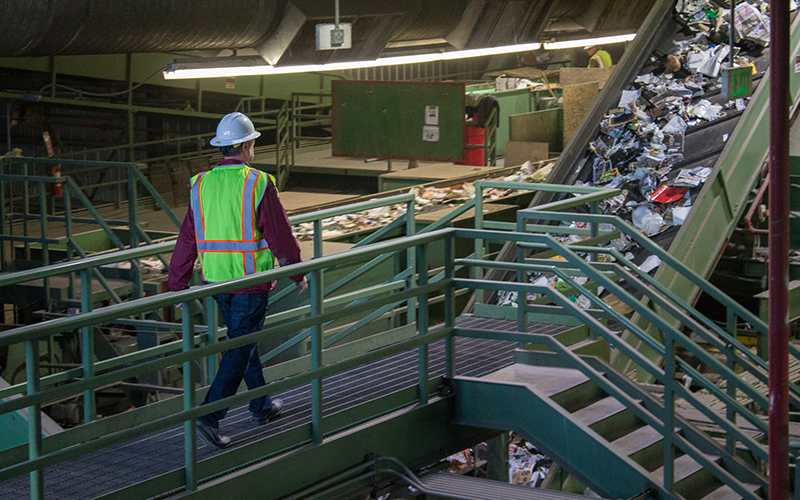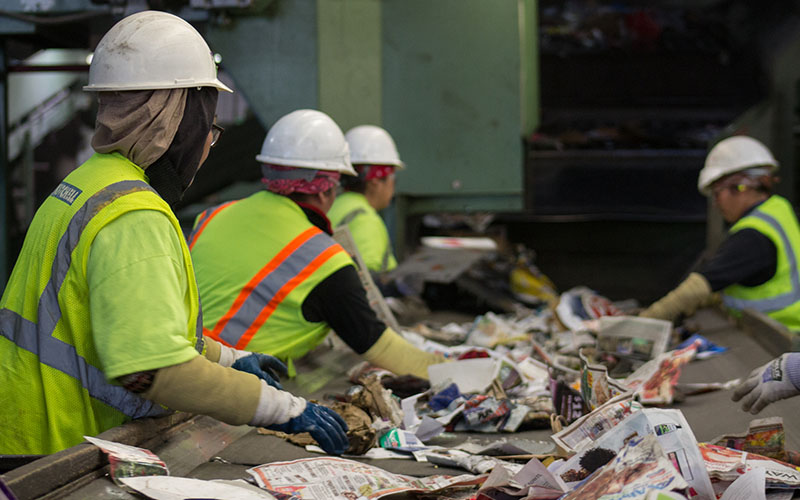
Phoenix Public Works Solid Waste superintendent Chad Hardy oversees production at the 27th Avenue Transfer Station. Phoenix continues to export recycled paper to China. (File photo by Miles Metke/Cronkite News)
PHOENIX – Most of the headlines from the trade war between China and the United States have focused on tariffs on aluminum and steel, but China also has placed a levy on recycled paper pulp. While not as well known, the 25 percent tariff could bankrupt the beleagured recycling industry in the United States.
China’s latest round of retaliatory tariffs against the U.S., announced in August, includes something called “recovered fiber materials,” basically, the paper, newspaper and cardboard that we put in the recycle bin. Trucks collect paper, bundle it at local centers and sell it as bales, mostly to China, to be incorporated into new products. It’s the cycle of recycling.
And now there’s a tariff on those exports, another cost for an industry already weakened by China’s announcement in January that it no longer would import most plastics and certain other recycled goods from the United States. The tariff was put in place the day the Trump administration imposed additional duties on Chinese imports.
“This is a huge impact on the paper business in the United States,” said Baizhu Chen, a business professor at the University of Southern California. “By taking a unilateral position against other countries, imposing a tariff against other countries, the U.S. is causing huge damage on the global trading system.”
“Certainly, the impact has been considerable to us in the first quarter,” said Pete Keller, vice president of recycling and sustainability for Republic Services, a solid waste collection company in Phoenix. “So, increased cost, decreased revenue, that doesn’t make for a winning equation in today’s marketplace.”
Since China’s import ban on most U.S. recycled products, municipal recycling programs have spent much of 2018 in crisis mode. And some U.S. cities can’t make it work. Phoenix, though, has had an edge, according to Rick Peters, deputy solid waste director for the city.
“Part of it is the dry climate from Phoenix really makes the materials being dry makes them easier to separate,” he said.
Phoenix has continued to export recycled paper to China during 2018, which has been key to keeping the program profitable. But that all changes with the tariff.
Chen says the tariff will negatively affect both American and Chinese businesses.
“This will have a big impact in China on the paper industry. They are short of feedstock,” he said. “And all the businesses are thinking about where to get that feedstock and paper if they are short of paper pulp. And also have an impact on the recycling business in the United States.”
China is the top importer of U.S. recycled paper, buying 2.73 million tons of U.S. corrugated cardboard during the first half of 2018 and 1.4 million tons of all other U.S.-sourced recovered fiber. Without China as the buyer of American recycled paper, the future of U.S. recycling is in doubt.
“China’s economy has been booming for so long,” Peters said, “that they developed a huge appetite for our recycled materials so they could turn it into new products and then ship them overseas to us in their shipping containers. And then the next thing you know, it was like 40 percent of U.S. recyclable paper was going to China. And this continued for many, many years.”
Trade between the two countries is not even. Last year, China’s exports of goods and services to the United States totaled about $500 billion, which dwarfs China’s imports from the U.S., which totaled about $150 billion.
“In time,” Peters said, “it’s going to take time, probably maybe several years, if China does not go back to buying, it’s going to take several years for demand and supply to get matched back up again to where the price of mixed paper and newspaper goes back up.”
Some businesses are not waiting for Beijing and Washington, D.C., to resolve the dispute. China’s largest paper manufacturer has begun buying U.S. paper mills, which allows it to not only sell directly within the U.S. but also ship paper remanufactured in the U.S. to China without paying a tariff.
Chen said Nine Dragons, probably the largest paper company in China, has been importing U.S. waste paper and was considering investing in the United States “to extract pulp from the papers and then sell the pulp into China, which is not in the ban, but now there’s a tariff.”
In May, Nine Dragons bought two pulp and paper mills in Maine and Wisconsin from Catalyst Paper Holdings, a Canadian company that owns a closed paper mill in Snowflake in northern Arizona. In August, Shanying International, China’s third-largest recycled paper producer, signed a deal to acquire a mill in Kentucky.
Neither Catalyst nor Nine Dragons commented on this report.
Chen continued: “So the strategy is coming to invest in the United States, instead of exporting the waste paper directly … they buy the paper mill to process the waste paper and to turn it into the paper pulp. So, theoretically, these are much cleaner. These are not classified as recycled products.”
Arguably, as Chen says, if the new product is not classified as recycled paper, it would avoid a potential tariff.
“So now, instead of processing that in China, and Nine Dragons, for example, those companies, they process the waste paper in the United States,” he said.
And it will be manufactured in a paper mill now owned by a Chinese company, not a U.S one, leaving questions about the future of the U.S. recycling business.
This story is part of Elemental: Covering Sustainability, a new multimedia collaboration between Cronkite News, Arizona PBS, KJZZ, KPCC, Rocky Mountain PBS and PBS SoCal.
